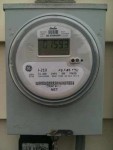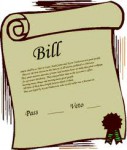In last week’s “Update,” we told you that both legislative chambers had produced committee substitutes for S.B. 1 and its companion bill H.B. 2001; these are bills that propose to repeal West Virginia’s Alternative and Renewable Portfolio Standard (AREPS). Both committee substitutes retain the net metering provision of the AREPS.
In testimony before the House Judiciary Committee on Monday, WVU Law Professor James Von Nostrand presented a cogent argument for keeping the AREPS in place, even if net metering is preserved. Professor Van Nostrand reminded the committee that in approximately 18 months, West Virginia will be required to submit a proposal for complying with the EPA’s “Clean power plan,” which is designed to cut carbon emissions from power plants, and that the AREPS provides the authority needed for developing our plan. If West Virginia fails to submit a compliance plan by the deadline, the EPA could impose a federal implementation plan. Nevertheless, the committee passed the Committee Substitute and the bill was introduced on first reading on Tuesday.
On Wednesday, H.B. 2001 was on second reading (amendment stage) in the House. Now, in case you missed it, on the first day of the session the Republicans had adopted a new Rule, designated Rule 95c, which says in part,
95c. Upon the introduction of any legislation which has a potential impact on the state’s economy, the Speaker may request from any institution under the authority of the West Virginia Higher Education Policy Commission . . . a review of the proposed legislation for purposes of preparing an Economic Impact Statement. The Economic Impact Statement may address the probable effect of any proposed legislation on the economy of the State of West Virginia including, but not limited to, the effect of the legislation on employment, job creation or reduction, and compensation.
So Delegate Mike Pushkin offered an amendment to H.B. 2001, asking for an economic impact statement (EIS), saying, “Why would we not ask for an EIS on this, the very first bill introduced? It seems the perfect opportunity to put the new rule into play, and if we can prove that it will preserve one job, I will support the bill.” However, the amendment was ruled not germane to the bill, which moved on to third reading without amendment.
Passage. S.B. 1 passed the Senate on Wednesday, 33-0. Then on Thursday, after about an hour of contentious debate, H.B. 2001 passed the House with only four dissenting votes: Fleischauer, Guthrie, Pushkin and Skinner. During the debate, Delegate Nancy Guthrie courageously told her fellow delegates that “We are going to wear coal around our neck like a yoke until it drags all of us down!”
Each bill now crosses over to the other chamber, but since they are nearly identical and each has passed its chamber of origin, they can be reconciled and go on to Governor Tomblin without passing the other chamber. On Monday’s first episode of WV Public Broadcasting’s “The Legislature Today,” the Governor appeared to be inclined to go along with the repeal of the AREPS, although he did express support for retention of net metering.
H.B. 2201. In a related development, Tuesday saw the introduction of H.B. 2201, which originated in the Judiciary Committee and which also codifies net metering requirements. Delegates apparently felt this bill was necessary because H.B. 2001 contains no definition of net metering. On Friday, 2201 was on third reading with right to amend, and an amendment by Delegate Folk (R-Martinsburg) was added, stating that
“The commission shall assure that any net metering tariff does not create a cross-subsidization between customers within one class of service.”
The intent of the amendment is to prevent costs from being passed on to all ratepayers in the event an electric utility finds it necessary to upgrade its system in order to comply with net metering. However, the amendment is unnecessary because the Public Service Commission is already empowered by Chapter 24-3-2 to prevent discrimination between customer classes. The amended bill passed 96-0.
The “cross subsidization” language had also been included in S.B. 1. H.B. 2001 is therefore our preferred version of the AREPS repeal bill; its failure to define net metering is not a problem since definitions are contained within the PSC rules. Committee references having been dispensed with, 2001 is on second reading in the Senate on Monday.
In this issue of Green, see Ken Ward’s related article which ran in the Gazette last Wednesday.







